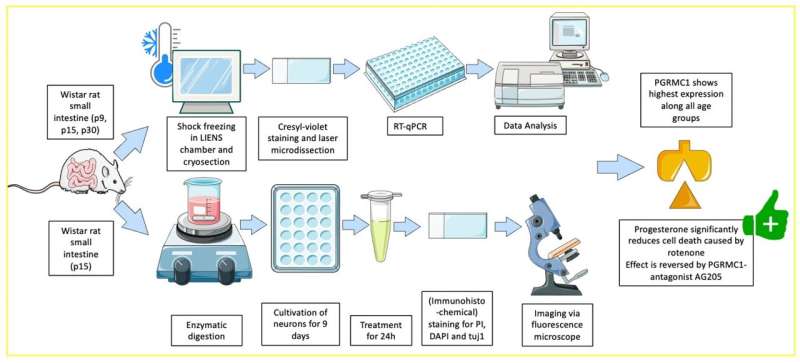This article has been reviewed according to Science X's editorial process and policies. Editors have highlighted the following attributes while ensuring the content's credibility:
fact-checked
trusted source
proofread
Study highlights progesterone's protective potential against Parkinson's

The nerve cells of the gastrointestinal tract communicate with those of the brain and spinal cord. This suggests that the nervous system of the digestive tract could influence processes in the brain that lead to Parkinson's.
Paula Neufeld and Lennart Stegemann, medical doctoral students at the Department of Cytology at the Faculty of Medicine at Ruhr University Bochum, Germany, were the first to detect progesterone receptors in the nerve cells of the gastrointestinal tract and showed that progesterone protects the cells.
Their findings open up new perspectives for the development of novel neuroprotective therapeutic approaches to counteract diseases such as Parkinson's and Alzheimer's. The study was published in the journal Cells on April 21, 2023.
The second brain
The enteric nervous system (ENS) is a complex network that stretches along the entire gastrointestinal tract. It consists of about 100 million nerve cells, autonomously controls digestive processes and is often referred to as the second brain of humans. But its function is much more than digestion. Recent research has shown that the ENS communicates closely with the central nervous system (CNS), i.e., the brain and spinal cord.
"The communication between the ENS and the CNS is currently associated with the pathogenesis of various neurological diseases such as Parkinson's disease and Alzheimer's disease, as well as depression," explains Professor Carsten Theiß, Head of the Department of Cytology at Ruhr University Bochum. The gut-brain axis is not a one-way street; both nervous systems influence each other.
A person's diet has a direct impact on the intestinal microbiome, which in turn interacts with the ENS. Studies show that the composition of the microbiome can also affect the CNS via the gut-brain axis, especially via the vagus nerve, and promote diseases such as Parkinson's disease. A balanced diet can therefore not only contribute to the preservation of nerve cells in the intestine, but may also delay Parkinson's disease for many years or even prevent it entirely.
The protective effect of progesterone
Medical doctoral students Paula Neufeld and Lennart Stegemann have now successfully demonstrated a protective effect of the natural steroid hormone progesterone on the nerve cells of the ENS. In a series of experiments, the duo cultivated nerve cells from the ENS over several weeks and treated them with a cell toxin to simulate harmful conditions similar to Parkinson's disease. They found that the nerve cells that were additionally treated with progesterone died significantly less frequently than the untreated cells.
Paula Neufeld points out the significance of their discovery: "Our research provides important insights to complete our basic knowledge about the role of progesterone receptors in the enteric nervous system. This opens up completely new avenues for studying the neuroprotective mechanisms of action of progesterone inside and outside the intestinal tract."
Lennart Stegemann adds that "this study could potentially pave the way for new steroid hormone-based therapeutic approaches. There is also hope that steroid-based therapeutic approaches could help to slow down or even stop neurodegenerative diseases."
More information: Lennart Norman Stegemann et al, Progesterone: A Neuroprotective Steroid of the Intestine, Cells (2023). DOI: 10.3390/cells12081206





















